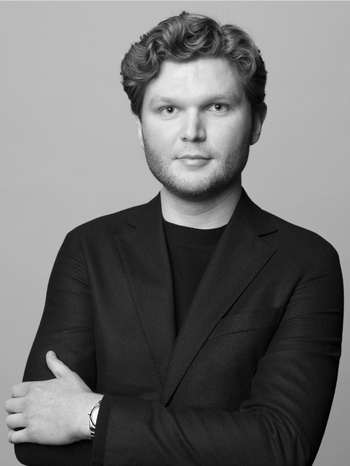Uno Åhrén
attributed to, a rare ebonized pear wood and pewter mirror model "A 1154", Firma Svenskt Tenn, early 1930s.
Of square shape. 55 x 55 cm.
The inner pewter inlay later, minor surface wear and tape remnants.
Literature
Catalogue, "Möbler - Firma Svenskt Tenn", Bröderna Lagerström 1931, model illustrated on the cover.
Exhibition catalogue, "Exhibition of Swedish Industrial Art London 1931", Nordisk Rotogravyr 1931, model illustrated pl. 50.
Eva Rudberg, "Uno Åhrén", Byggforskningsrådet 1981, compare model illustrated p. 107.
Hedvig Hedqvist, Rikard Jacobson & Jan von Gerber, "Modernt Svenskt Tenn", Atlantis 2004, p. 91.
More information
Designed ca 1929-30.
The model is recorded in the production log in the archive at Svenskt Tenn without a documented designer. Versions of mirrors in ebonized wood and pewter designed by Uno Åhrén were displayed at the Swedish Exhibition of Industrial Arts & Crafts at Dorland House in London in March-April 1931 and subsequently at Galerie Moderne in Stockholm in September that same year, which is why Åhrén is considered the attributed designer of the present mirror model.
Designer
Uno Åhrén was a Swedish architect who graduated from Tekniska Högskolan i Stockholm (the Royal Institute of Technology) in 1919. Uno Åhrén made his debut with a residential interior at the "Home Exhibition" at Liljevalchs in 1917. He was one of the earliest collaborators with Estrid Ericson at the Svenskt Tenn. Åhrén participated in the Paris World Fair in 1925 with a ladies' salon.
Åhrén, who would become one of the main advocates of functionalism, he only worked as a furniture designer at the beginning of his career. The late 1920s in Sweden were marked by Åhrén's radical thoughts and ideas; he was one of the most eager proponents of functionalism, including as a co-author of the publication "acceptera".
Åhrén's focus was primarily on the social perspective in housing issues. From the late 1910s onwards, Uno Åhrén participated in a number of industrial art exhibitions: in addition to the mentioned Home Exhibition in 1917, the Gothenburg Exhibition in 1923, the Paris World Fair in 1925, the Stockholm Exhibition in 1930, and the World Fair in Chicago in 1933. After 1930, Åhrén devoted himself mainly to urban architecture and city planning, including as a city planning architect in Gothenburg from 1932-43 and as the head of Svenska Riksbyggen during the 1940s. He is most renowned for his strong pathos as a driving debater in the social housing issue. For Svenskt Tenn, he designed both furniture and pewter objects of a more luxurious nature.


















































